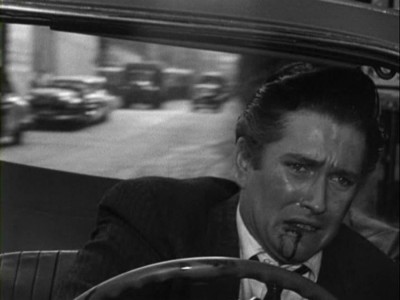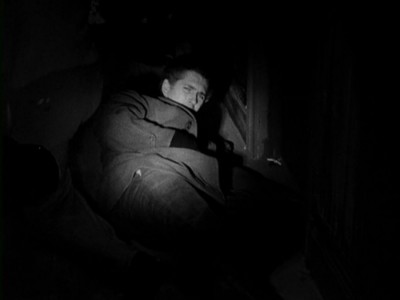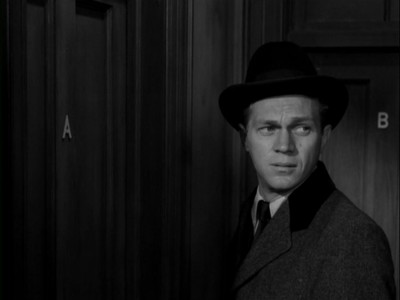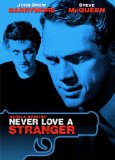| Reviews & Columns |
|
Reviews DVD TV on DVD Blu-ray 4K UHD International DVDs In Theaters Reviews by Studio Video Games Features Collector Series DVDs Easter Egg Database Interviews DVD Talk Radio Feature Articles Columns Anime Talk DVD Savant Horror DVDs The M.O.D. Squad Art House HD Talk Silent DVD
|
DVD Talk Forum |
|
|
| Resources |
|
DVD Price Search Customer Service #'s RCE Info Links |
|
Columns
|
|
|
Never Love a Stranger
Lionsgate, in association with Republic Pictures, has released Never Love a Stranger, a talky 1958 gangster melodrama from Allied Artists, based on the first best-selling novel by Harold Robbins. If remembered at all, Never Love a Stranger's chief claim to fame today is an appearance by Steve McQueen in his first theatrical supporting turn - a minor film fact not lost on Lionsgate, which lets McQueen's face dominate the DVD front cover. McQueen fans not familiar with this title (I don't remember it ever playing on TV) shouldn't be fooled, though; he only shows up for a few scenes here - and with little impact. And gangster fans hoping for some hard-edged thrills will have to look elsewhere than this overly familiar, long-winded, studio-bound programmer.

Orphaned Francis "Frankie" Kane (John Drew Barrymore) has grown up to be a tough but honest kid on the mean streets of New York. Raised in a Catholic orphanage by Father Bernard (Douglas Rodgers), Frankie aches to own something, anything, that hasn't belonged to somebody else first. Shining shoes at the local pool hall, he encounters "Silk" Fennelli (Robert Bray), a smooth operator who controls all the rackets and shakedown scams in the neighborhood. Impressed by Frankie's honesty when he returns change from a fifty to buy some shoe polish, Silk keeps his eye on Frankie (who graduates to running numbers for his bar owner boss, Jimmy Keough, played by Walter Burke). When Silk gets plugged by rival gangsters, he entrusts a wad of dough to Frankie (lest the cops snatch it) - a load of moolah that may provide Frankie with a sudden means of escape.
You see, Frankie finds out from Father Bernard that a terrible mistake was made when he was brought to the orphanage. The midwife who delivered him, Mrs. Cozzolina (Augusta Merighi), never looked in Frankie's mother's suitcase (she died in childbirth); she just stuck it in the back of her closet and forgot about it. But coming upon it seventeen years later, she discovers a Hebrew Bible in it: Frankie is really a Jew. The law at this time requires Frankie to be moved out of the Catholic orphanage to a Jewish one (the film never states if this is Church "law," or an actual state statute), but Frankie is devastated by the news. He doesn't want to leave, and he doesn't want to be a Jew. So he decides to run away, and he borrows 20 dollars of Silk's money to do so (he leaves an I.O.U.). He says goodbye to his girl, Julie (Lita Milan), and to his best friend, Martin Cabell (Steve McQueen), a weak kid who moved into the tough neighborhood for the sake of his politician father.
On the bum, Frankie gets lost for seven years, while Julie becomes Silk's moll, and Martin, through the good graces of his father, becomes a lawyer and an assistant to the D.A.. A road accident back in New York puts Frankie in the hospital - as well as in contact, by chance, with Martin - who offers to help Frankie get back on his feet. But the years have been hard on Frankie, and he doesn't want to go the legit route. He looks up Silk, and becomes one of his boys, working his way up steadily through the ranks until he overtakes Silk and becomes self-proclaimed "Commissioner" of all the mobs. But this high profile makes Frankie a target for the cops and politicians - as well as the nervous gangsters who worry about getting pinched when Frankie is declared public menace number one.
SPOILERS ALERT!
Having never read the novel that inspired Never Love a Stranger (I confess to reading only one Harold Robbins novel: The Carpetbaggers. It was...junk), I can't say with any certainty if Robbins was any more successful with the mishmash of themes such as religion, gangsterism, and crisis of identity that make up the slight, confused Never Love a Stranger film. If there are genuine ideas going on around in the head of Never Love a Stranger , they're muffled and finally silenced by the movie's deathly dull execution. Never Love a Stranger was published back in 1948, a full ten years prior to this adaptation, but I have to believe that even back in '48, Robbins' clichéd take on religious intolerance and street-wise gangsters was old hat. Reading up a little bit on the novel, it evidently was published (and quite successfully, too, with over 3 million copies sold) strictly on the basis of its then shocking frankness concerning sex. Ten years later, however, all of that smut has been whitewashed clean here; even 1958 exploitation films were lily-white in comparison to what was frequently coming out in hardcover in American bookstores.

Forgetting the sex and moving on to the violence, anyone with even the slightest background in classic Hollywood gangster and mob films will have Never Love a Stranger's trite plot down within two minutes (in particular, it apes Manhattan Melodrama something fierce). Who in 1958 hadn't already seen this story of two young boys - one good, one bad - growing up to be friendly foes as they straddle the worlds of justice and crime, a hundred times before? As for Never Love a Stranger's foray into religious intolerance, this serious subject is treated with an almost blasé contempt, being merely used time and again as a plot device to keep the storyline ball rolling along. Throughout the film, other characters vaguely refer to Frankie's Jewish heritage, but nothing meaningful is made out of the dichotomy that his conflicting faiths obviously cause in Frankie. He reacts violently when he learns he's Jewish (even though he helped Martin, a Jew, escape the wrath of a bigoted gang of toughs), but later in the film, he never mentions it again - even when others do. If the novel had the answer to Frankie's take on his religious upbringing and identity, Never Love a Stranger the film certainly doesn't.
All of which of course wouldn't have amounted to a hill of beans if the movie had at least moved. Starting off all wrong on a silly note, the film begins and continues sporadically with a rather remarkably camp voice-over narration by Milo O'Shea, of all people, speaking in breathless terms about "Life," "Eternity," "Cycles," and "Human Spans." Frequently sounding like those hilariously tame, censored 16mm "miracle of life" sex-ed instructional films we watched back in middle-school (with fruity doggerel phrases that could only have come directly from Robbins' book), this narration comes in at the most inopportune times, and only serves to reinforce the gimcrack nature of the production. Having grown up with these types of films on TV, from Saturday afternoon movie shows to the beloved "Late, Late Show," the sight of "an Allied Artists Picture" was usually a good indicator of cheap, fast thrills (or at least humorous, entertaining incompetence), but Never Love a Stranger has neither of those redeeming qualities. Allied Artists may have had a reputation for sensationalism, but this has got to be the tamest gangster exploitationer I've ever seen. Where's the killing? Where's the roughing up? Where's the love making with the gorgeous broads? Except for some ancient stock footage of some mild gangster action, there's only one extremely brief shoot-out, and one or two beatings.
And the rest is talk. Endless talk. Confined mostly to overlit studio sets, Never Love a Stranger isn't a slugfest - it's a yakfest, and a largely desultory one, at that. The opening, admittedly, is quite arresting. There's a terrific shot of Barrymore, bleeding from the mouth, driving to his death as he careens his car into a subway support. Anyone watching that dynamic, noir-ish opening might have had high hopes for Never Love a Stranger, but aside from an atmospheric scene here or there (Frankie sleeping in a squalid hallway, one or two isolated location shots), the remainder is depressingly square and straight-ahead. The director, Robert Stevens, helmed one of the greatest Twilight Zones ever: Where is Everybody?, as well as a couple of interesting early 60s widescreen melodramas (I Thank a Fool and In the Cool of the Day), but for the most part, his career was confined to anonymous TV fare, and it shows here. From unimaginative framing to glacial pacing to a generally dispirited tone, Never Love a Stranger never leaves the pad.
And that's too bad, because the cast is at the very least, competent. Of course, Lionsgate would like you to think McQueen is the main draw here, but he has limited screen time, and at this point in his career, he hadn't yet learned how to transfer to the screen the ultra-cool, loner tough-guy persona he would perfect within just a couple of years (although he would certainly learn his craft on his excellent western, Wanted: Dead or Alive). Playing the William Powell role here, McQueen fails to register much of anything in the manner of charisma or sex appeal or even a mildly interesting thespian approach. Trying to divorce his later career from your mind, you'd be hard pressed to imagine him achieving any kind of lasting success in the business, based on this colorless portrayal. Barrymore, though, isn't too bad, actually, as the mixed-up punk Frankie. Far more famous throughout his life for his "First Family of American Theatre" lineage and his numerous and bizarre personal problems (alcoholism, wife beating, mental illness, just to name a few), you can tell, though, that he has something there, some kind of appeal, some kind of talent, had he only the discipline to nurture and develop it. The rest of the cast, many of them Actor's Studio alumni, are game, as well (R. G. Armstrong as the pragmatic henchman and Robert Bray as the decent/violent crook Silk, give the strongest showings here), but they have so little to work with, frustration eventually wins out over hope for even a decent little programmer.

The DVD:
The Video:
Watching the 1.33:1 full-frame transfer for Never Love a Stranger, I was suspicious of the framing when things began to look a little tight and people were getting cut off on the sides of the frame. IMDB has the film's original aspect ratio at 1.85:1 (although that source is hardly the be-all, end-all authority on these things), so I cropped it on my monitor, and it looked decent enough, but a lot of information was being lost on the top and bottom, with heads getting chopped, as well. Perhaps the original was an open matte 1.37:1, with a soft matte projected 1.66:1 in the theatres - which seems about right (1958 seems awfully late for a projected old Academy ratio). If anyone has specific information on this title's original theatrical ratio, please feel free to email me, and I'll amend the review. As for the image itself, it's of average sharpness, but interlacing was a problem (I had a lot of difficulty getting decent screen caps during the action sequences), and heavy grain is apparent at times. Blacks aren't dead solid, but acceptable considering the source.
The Audio:
The Dolby Digital English 2.0 audio mix is like the image transfer, adequate, with dialogue heard well enough (although the original elements betrayed some warbling here and there). English and Spanish subtitles are available, as well as English close-captions.
The Extras:
Other than some trailers for other Lionsgate films, there are no extras for Never Love a Stranger.
Final Thoughts:
That cover might convince some Steve McQueen completists to take a look at Never Love a Stranger (I'll admit to being a little bit excited about seeing it). If you know anything about McQueen's career, it's one of those titles always mentioned in books and articles, but one rarely seen. Well, after seeing it, it's no wonder why it's relatively obscure. A thoroughly familiar gangster plot borrowed from a dozen other better films, painted over with an out-of-date, vague look at religious intolerance, spread out over a talky, action-less script, makes Never Love a Stranger a thoroughly disreputable exploitationer. Disreputable because it's dull. McQueen fanatics might rent Never Love a Stranger; all others will skip.
Paul Mavis is an internationally published film and television historian, a member of the Online Film Critics Society, and the author of The Espionage Filmography.


|
| Popular Reviews |
| Sponsored Links |
|
|
| Sponsored Links |
|
|
| Release List | Reviews | Shop | Newsletter | Forum | DVD Giveaways | Blu-Ray | Advertise |
|
Copyright 2024 DVDTalk.com All Rights Reserved. Legal Info, Privacy Policy, Terms of Use,
Manage Preferences,
Your Privacy Choices | |||||||













